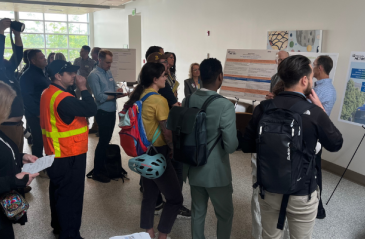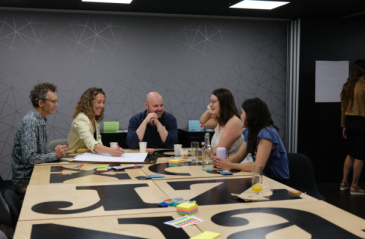
The information barriers holding back climate action and how to break them

Charities, NGOs and social enterprises are starting to embrace technology, says @Sam_Applebee
Share article@Super_Global_ bridges the gap between civil society and creative and tech agencies
Share articleWe need to improve the tech capability of social problem solvers, says @Sam_Applebee
Share articleWe put our vision for government into practice through learning partner projects that align with our values and help reimagine government so that it works for everyone.
The tech revolution has left no sector of society untouched - and rightly so. Let's face it, not to use digital technology would be to turn your back on new and enhanced ways to achieve your objectives large and small. From online portals that can help bring communities closer to governments, through to technology providing early warning systems of threats such as tsunamis, the impact - and potential - of technology to do good is clear.
Social organisations, such as charities, NGOs and social enterprises, are also starting to embrace these digital possibilities. Granted, progress has been slower than in the private sector, but converts are already demonstrating how tech can improve their public impact, as well as the performance of their internal organisations.
That's the good news. Unfortunately, while a huge shift is certainly en route, there is more to be done in order to accelerate this process. Digital opportunities may well adorn civil society's horizon, but the scope to do more, and do it faster, remains huge.
Part of the problem is that civil society organisations have not been that good at working with creative and tech agencies. I spent five years in the creative/tech world and everywhere I went I heard about relationship problems rooted in cultural misunderstandings, confusions about payment processes, and much else besides. Maybe this is why the quality of creative and tech solutions delivered for these organisations has been lower than those in the commercial sphere.
But this is where our not-for-profit, Super Global, comes in. We founded it to help creative and tech agencies work with and empower social impact organisations. We began as a design agency trying to do good on our own. But we kept failing because we didn't understand well enough the problems that social organisations were trying to solve. In our defence, remember that these are some of the most deeply ingrained issues facing not only civil society but governments as well - from child poverty in developed countries to food security in the developing world.
And as a result, we adopted a model of partnering with social organisations in this space - which has been working well. Super Global is, in essence, an interface between a community of agencies committed to using their expertise for good and the social organisations tasked with solving some of society's toughest challenges.
We work with other agencies and with social organisations in a number of ways. For example, we build relationships with social organisations and help them validate opportunities to use creative and tech services to improve their effectiveness. Then we help them set out and articulate their needs in a format that agencies can engage with. Agencies are shortlisted according to their expertise and experience on that particular issue, and we help run an informal tender to help the client choose the partner that fits best.
During the collaboration, we provide independent advice to both partners. Asking timely questions, flagging potential pitfalls, and offering our experiences all reduce the chance of future problems and breakdown. And then, as the project winds down, we run a “lessons learned” session to understand what went right with the collaboration and how it could have been improved. We consider next steps for the project and lay the foundations for an ongoing partnership.
A good example of this process is our work with Amnesty International to identify a range of opportunities using advanced data analytics. Together we scoped projects to help them investigate online abuse of women MPs, better understand and target the audiences they want to engage, and track the impact of their reports in the media. We matched them with tech partners and continued to provide independent advice throughout delivery.
This is just one story of many, but it shows what can be achieved when tech agencies and social organisations come together. This is just the start, though. The big goal is to increase the quality and supply of expertise available to social problem solvers and to improve their tech capability, so that there's no need for organisations like our own in the middle. The sooner we're out of business, the better!
Social impact: metrics, mission and transformation lessons. After a long stint in the commercial world, Dave Young was determined to make a difference in global development that's focused on children. He tells us about transformation, outcomes and impact
What next for South Africa's social impact bonds? The first wave of social impact bonds has hit South Africa's Western Cape, focusing on early childhood development, explains Aunnie Patton Power
Surging social investment in the UK. Investments don't just have to be about financial returns. Social investment - which also aims for an improved social outcome - enjoys increasing prevalence and importance. Cliff Prior tells us why...
Advancing impact investing in Australia. Impact investing is taking root as a key tool in Australia's approach to achieving social and financial benefits for its communities and institutions. We hear from Daniel Madhavan about the story so far












